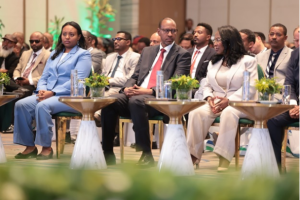
Cooperation is the best alternative for Nile Riparian countries, in their endeavor to exploit and get the most benefit out of their resources. The resources that allow them to tie one another should never be a point of contention; they would rather be a cause of cooperation and development.
Indeed, these countries have established the Nile Basin Initiative, a regional intergovernmental partnership that came into being on February 22, 1999, to manage and develop the shared Nile Basin water resources in a cooperative manner, share substantial socio-economic benefits, and promote regional peace and security.
Before the commencement of this initiative, no one was allowed to raise questions related to equitable water utilization as Egypt and Sudan allocated water quotas, presenting the colonial treaty as a justified reason. Amazingly, Ethiopia, a country that contributes 86 percent of the Nile River, and other riparian countries do not have a viable right to use or build any projects using the river.
Over the past 13 years, the government of Ethiopia has been making relentless efforts for negotiations based on fair use among the Nile basin countries, besides building the dam. As the dam is built on a trans boundary river, extensive discussions and negotiations were held with the downstream countries.
So far, Ethiopia has been discussing the position of fair use of water in the negotiations. However, countries that use the Nile water, devising their own share, such as Egypt and Sudan, were arguing with the extreme idea that only we should use it. However, the position of these countries is against the international principle of fair utilization of waters.
During the negotiations, Ethiopia has done a great job in informing downstream countries that the dam will not cause significant harm and that it has full rights to use the water as the sourcing country for the river. The negotiations had gone through many conditions. Ethiopia has reached the final construction stage of the GERD without stopping the negotiations.
Next, the GERD should be used properly. It is necessary to generate an income by selling the electricity produced from the dam to neighboring countries for domestic consumption. If there is a demand for electricity on the Egyptian side, the door to Ethiopia remains open. It is good to strengthen the existing economic ties for mutual benefit.
Since November 2019, Ethiopia, Sudan, and Egypt have held dozens of trilateral talks on the filling of the reservoir and the operation of the dam, which were supported and attended by the US and the World Bank as “observers.”
As they are sticking to the 1929 and 1959 colonial treaties, Egypt and Sudan have not agreed with Ethiopia on an equitable Nile water share yet. Upstream states believe a new agreement must replace the colonial treaties, whereas Egypt insists that any agreement must recognize the colonial treaties and those they continue to be binding. On the other hand, Ethiopia asserts that there is no legal ground to stop Addis Ababa from equitably using the Nile waters.
Later on, some Nile riparian countries come up with the text of the Cooperative Framework Agreement (CFA), which outlines principles, rights, and obligations for cooperative management and development of the Nile Basin water resources, and put their signatures on it. Article 14 of the CFA requires the basin states to work together to ensure that all states achieve and sustain water security.
For the CFA to come into force, it needs to be signed and ratified by at least six (6) riparian states. To date, it has been signed by six countries (Ethiopia, Tanzania, Rwanda, Uganda, Kenya, and Burundi) and ratified by four, i.e., Ethiopia, Tanzania, Rwanda, and Uganda.
Citing Burundi having signed the CFA during his tenure, Burundian Ambassador to Ethiopia Willy Nyamitwe recently told The Ethiopian Herald that this is a good move between Ethiopia and Burundi since we are sharing the same view in terms of sharing Nile waters. We need a Nile to benefit all Africans and the world as well. So, we are sharing the same views, he added.
The Nile Riparian countries should not only talk about equitable water shares; they should also talk about how they can sustainably use their resources, especially the Trans Boundary Rivers like the Nile. If they agreed on that, they also engaged in various environmental development tasks, as some of them are now engaged in.
Florence Grace Adongo is the Executive Director of the Nile Basin Initiative (NBI) Secretariat. She recently told the local media that the national environmental programs of the Nile riparian countries have been greatly contributing to the sustainability of the basin. She said that as environmental sustainability is one of the key pillars, NBI has continued to push those riparian countries to reinforce the program at the national level.
“What we are doing is encouraging countries at the national level to continue their environmental re-afforestation and restoration programs. Ethiopia, for its commendable strides, has been executing various environmental programs, including the Green Legacy Initiative. “Ethiopia has done very well, and we appreciate that,” she said.
Similarly, other countries, for example, Kenya, Uganda, and Burundi, among others, have annual targets as well. Praising the efforts of countries at the national level, which are hugely impacting the sustainability of the Nile Basin, she said that we would want to appreciate nations for their contribution.
The Nile Basin Initiative secretariat is demanding resource mobilization to implement extra projects for the basin. As the secretariat continues to reiterate its commitment, we are also looking into resource mobilization and having projects going forward, Adongo further noted.
Pinpointing key pillars to manage and sustainably develop the common Nile Basin, the executive director indicated that some of them do not attract resources quite easily like others. “We are adapting an integrated approach. If we are working in one basin, for example, developing hydropower, we should also look at the catchment. If the catchment of that basin is not maintained, then the infrastructure that we have built will not be sustainable.”
Regarding the role of NBI in over 25 years of engagement, she said it served as the platform for dialogue, a catalyst for change, fostering regional integration, enhancing competitiveness, and unlocking the Nile Basin’s immense potential for Africa and beyond. NBI covers 10 percent of the African continent and is home to almost a quarter of the continent’s population.
In spite of their immense potential for massive development, Nile Basin countries face key development challenges related to water security, energy security, food security, and vulnerability to the environmental shocks that are rising from the negative impacts of climate change.
Acknowledging the aforementioned challenges, Adongo revealed that no county can manage them unilaterally. Therefore, she stressed that countries across the Nile Basin should come together to find a common solution for such common problems.
Unless the riparian countries manage their resources perfectly, they will pay a price, as any resource has its own limitations. Thus, we should begin water conservation tasks now and then parallel to wisely make use of the water for the benefit of all.
BY GIRMACHEW GASHAW
THE ETHIOPIAN HERALD WEDNESDAY 8 MAY 2024




